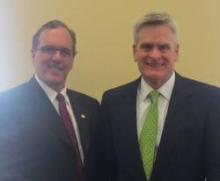John I. Allen, M.D., MBA, AGAF, AGA Institute president, was on Capitol Hill in February meeting with key legislators and AGA allies to discuss issues of importance of GI and thanking them for their ongoing support. Throughout the day, Dr. Allen’s discussions focused on issues related to physician payment reform, NIH research, patient access to life-saving treatments, and colonoscopy Medicare coinsurance.
The lawmakers and their staff appreciate AGA’s positions on these issues and agree with the need to reform the Medicare payment system, although opinions differ on the best way to pay for a fix. Dr. Allen conveyed to lawmakers that regardless of whether or not Congress enacts a permanent fix to the sustainable growth rate formula, AGA will continue to work on alternative payment models, such as bundled payments and episodes of care for GI conditions and diseases, and we continue to work with private payers to implement these models.
Dr. Allen also focused on AGA’s support for efforts in the House and Senate on the 21st Century Cures initiative to modernize and accelerate the process of developing and delivering new treatments and technologies for patients. Legislators were very interested to learn about AGA’s efforts to support innovation and the development of new technology in gastroenterology, hepatology, nutrition, and obesity by guiding innovators, companies, private equity, and venture capital through the technology development and adoption process. Dr. Allen met with bipartisan staff of the Senate Health, Education, Labor, and Pensions (HELP) Committee to discuss some of the challenges facing innovation in GI devices in the past decades. He discussed what AGA has done in working with the FDA and device companies in establishing observational research registries to obtain key postmarket surveillance data and our partnerships with private payers in getting coverage for some of these emerging technologies. Dr. Allen talked to key HELP and Energy and Commerce Committee staff on AGA’s efforts to convene a meeting with FDA, CDC, scope manufacturers, and other stakeholders on the issue of infection due to duodenoscopes and conveyed AGA’s zero-tolerance policy for infection and developing protocols to ensure patient safety.
Also discussed was the importance of medical research to the U.S. economy and the need for Congress to fund NIH at $32 billion for fiscal year 2015, which represents the minimum investment necessary to avoid further loss of promising research and to allow the NIH budget to keep pace with inflation. Dr. Allen stressed the need to provide incentives and encourage our best and brightest young investigators to choose research careers, and how many of the NIH research grants are going to more established researchers. While the legislators were understanding of our position, because of the continuing uncertainty of the current fiscal climate, there is doubt whether the NIH budget will be increased.
ginews@gastro.org



